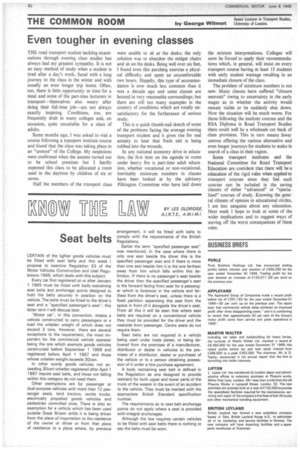Even tougher in evening classes
Page 84

If you've noticed an error in this article please click here to report it so we can fix it.
THE road transport student tackling examinations through evening class studies has always had my greatest sympathy. It is not an easy method of study when a student is tired after a day's work, faced with a long journey to the class in the winter and with usually an even longer trip home. Often, too. there is little opportunity or time for a meal and some of the part-time lecturers in transport—themselves also weary after doing their full time job—are not always exactly inspiring. Conditions, too, are frequently drab in many colleges and, on occasion, quite unsuitable for a class of adults.
Some months ago, I was asked to visit a course following a transport institute course and found that the class was taking place in an -annexe" of the College. My suspicions were confirmed when the annexe turned out to be school premises but I hardly expected this class to be allocated a room used in the daytime by children of six or seven.
Half the members of the transport class were unable to sit at the desks; the only solution was to abandon the midget chairs and sit on the desks. Being well over six feet, I found even this perching exercise a physical difficulty and spent an uncomfortable two hours. Happily, this type of accommodation is now much less common than it was a decade ago and some classes are housed in very reasonable surroundings; but there are still too many examples in the country of conditions which are totally unsatisfactory for the furtherance of serious study.
This is a quick thumb-nail sketch of some of the problems facing the average evening transport student and it gives rise for real anxiety to hear that fresh salt is being rubbed into the wounds.
In any national economy drive in education, the first item on the agenda to come under heavy fire is part-time adult education, whether vocational or non-vocational. Inevitably minimum numbers in classes have been looked at by the advisory Pilkington Committee who have laid down the strictest interpretations. Colleges will soon be forced to apply their recommendations which, in general, will insist on every transport course having at least 15 students with early student wastage resulting in an immediate closure of the class.
The problem of minimum numbers is not new. Many classes have suffered "closure neurosis" owing to uncertainty in the early stages as to whether the activity would remain viable or be suddenly shut down. Now the situation will be much worse. For those following the institute courses and the RSA Diploma in Road Transport Studies there could well be a wholesale cut back of class provision. This in turn means fewer centres offering the various alternative and even longer journeys for students to make in search of a class in their region.
Some transport institutes and the National Committee for Road Transport Education are comident that there will be a relaxation of the rigid rules when applied to transport courses since they feel such courses can be included in the saving clauses of either "advanced" or "specializedcourses of study. Knowing the general climate of opinion in educational circles, I am less sanguine about any relaxation. Next week I hope to look at some of the wider implications and to suggest ways of staving off the worst consequences of these rules.


























































































































